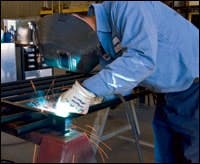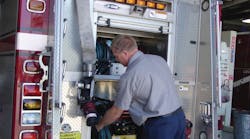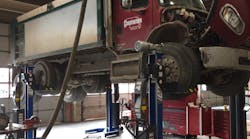Headquarters: Jacksonville, Fla.
Specialties: Municipal fleet-management division
Fleet Value: $120 million
Fleet Makeup: 5,400 units including 154 pieces of fire and rescue apparatus, 100 off-road construction machines; 410 Class 7 and 8 trucks, and 2,250 light trucks and cars
Facilities: 1 shop, 8 mechanics trucks, 3 lube service trucks, 3 fuel trucks
Equipment-Support Staff: 158 total including 121 mechanics, fabricators, and supervisors/lead workers
Market Range: Duval County — 840 square miles with 750,000 population
Outsourcing may be a good alternative to a work-resistant workforce, but Jacksonville's own technicians called the city to do its own warranty repairs and the resulting efficiency gains ultimately led the city to hire itself out as a service vendor to the Florida DOT.
"We had excess capacity that wasn't being tapped," says Sam Houston, chief of the City of Jacksonville's fleet maintenance division. "There's a fire-apparatus vendor's shop right next door to us, and it had become easy to send pretty much all of the repairs on that equipment over to them. My people saw it and knew it shouldn't be happening. They didn't have enough work to do.
"The fire department liked the situation they had, but it was costly, and we can do the job just as well. Of course, there's an incentive for the technicians to keep that work here, if they get some overtime. We took that work back in-house and they started getting a little overtime."
He also brought the fleet's brake and tire service work, which was being sent out to local vendors, back into the city's shop.
To keep from overdosing on overtime, Houston leans heavily on the city's production bonus system for technicians and shop supervisors. Division management sits down annually with each shop production person and they agree on a goal for that individual's production. If the person reaches the goal, he or she receives a bonus equal to one percent of base salary.
"Our people rose to the challenge — we saw productivity come up," says Houston. "We took on all this extra work and still reduced payroll."
In the last fiscal year, only two employees failed to reach their production targets. The fleet-management-division's administrators maximized shop capacity by meticulously scheduling work. The division processed 74,000 work orders last year, and billed 137,000 labor hours — 74 percent of the work orders were completed within 24 hours with an average turnaround time for all equipment of three days. Auto and light-truck safety inspections are scheduled up to two months in advance, and most are completed on the same day.
Payroll costs are down $902,000 and outside-vendor costs have dropped $777,000. Houston has chosen not to fill 21 staff positions that opened due to attrition. The additional people weren't necessary.
As the city has judiciously applied overtime, they've also carefully chosen some work to outsource. For example, all auto and light-truck services — oil and filter changes — are done by vendors at a contracted bid price. Last year, 18,936 PMs were performed — 96 percent of them on schedule.
Improved shop productivity has translated directly into cost savings. The fleet management division has become an authorized warranty center for Ford, General Motors, International, American LaFrance and Pierce fire apparatus. They've pursued the warranty work aggressively.
"If I have a vehicle I'm working on — doing a PM, for instance — and I see something wrong with it that's under warranty, it's much easier to just do the warranty work myself rather than stop doing what I'm doing, put the vehicle back together, and send it over to the dealer so they can make the warranty repair," says Houston. "So we approached GM and the other Big 3 automakers and said, 'We would like to be certified to do warranty work in-house.' They have a set procedure — a flat rate for each job. We tell them what we did, show them the part number, and they reimburse us."
Houston says documentation is key to recovering warranty dollars. He instituted a simple system in Jacksonville. When a service writer suspects that there may be a warranty to be claimed on a repair order, the order is printed and stamped with a red "WARRANTY" stamp. The city's accounting department routes all WARRANTY-stamped repair orders to Houston's warranty clerk, who compares the vehicle and part numbers to a database of fleet warranties.
"In 2000, we had $18,000 worth of warranty claims, then $30,000 the next year," says Houston. "Since we implemented this program in the last two years, our warranty claims have gone up to around $80,000."
Other government fleet operations started to see what was happening in Jacksonville, and it wasn't long before the Florida Department of Transportation asked Houston to supply fleet services for their local operations.
"We worked on the details and legal ramifications of the agreement for several months, then agreed on the hourly labor rates and planned to charge them flat rate by the book," says Houston. "They were able then to figure out maintenance cost and say, 'Wow, we can get this done for $250,000 and cut our budget by $200,000 by eliminating all these little shops that we operate around Jacksonville and Duval County.'"
Jacksonville integrated 250 to 300 pieces of Florida DOT equipment into its fleet operations. They've been maintaining the yellow equipment side-by-side with Jacksonville's white vehicles and machines for about three years. The work pours about $250,000 of revenue per year into the city's fleet-management division. And it adds about 3,000 work orders to the city's normal flow.
Being accountable to a "customer" outside of city operations actually contributed to the scheduling discipline that has been instrumental to Jacksonville's improving shop productivity. Houston considers it one of the most important lessons learned from working for the DOT.
"You have to monitor the turnaround times to make sure they get equipment back in a timely fashion," he says. "We schedule their stuff in for PM, so it's in and out in the same day."





